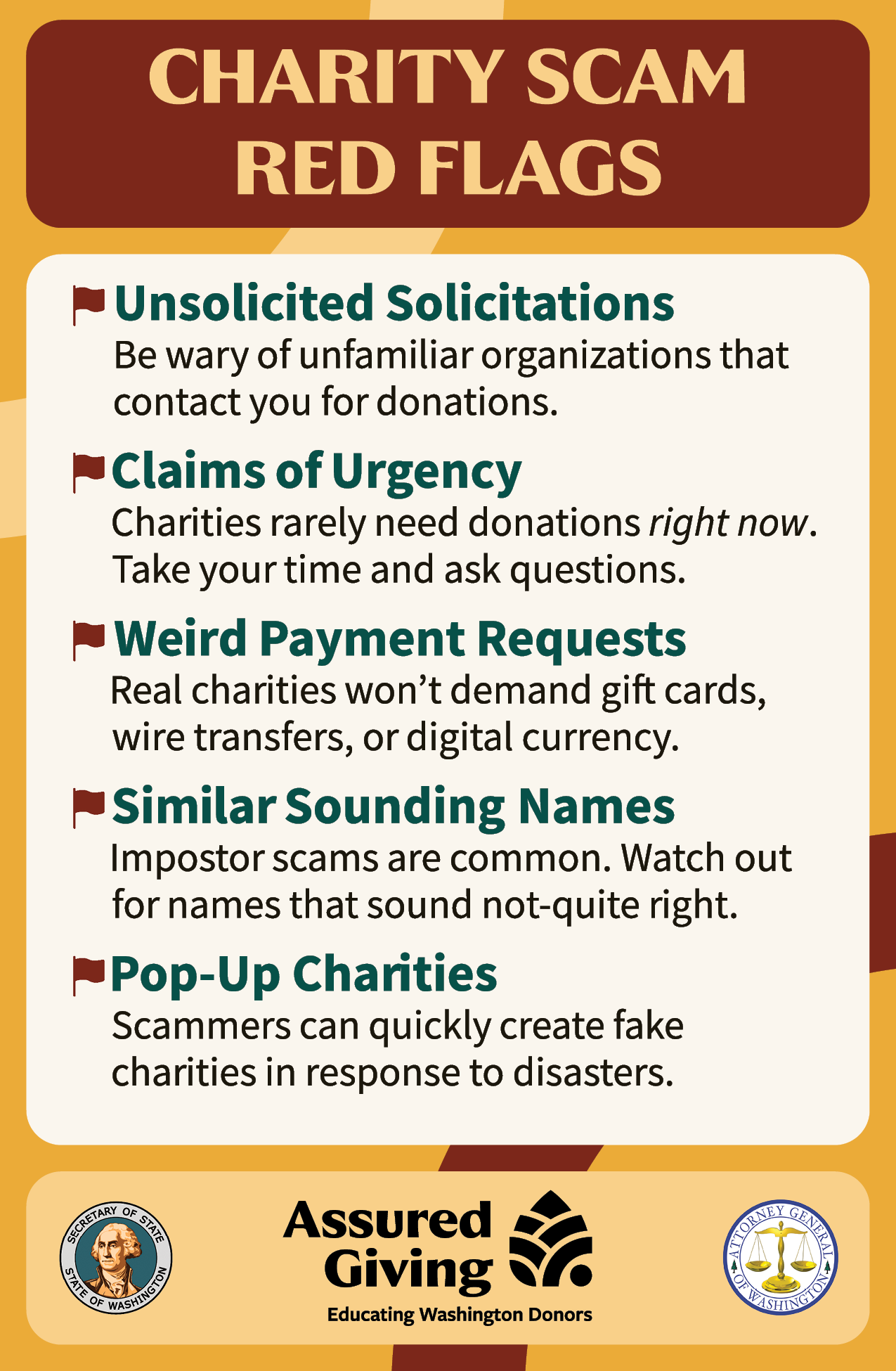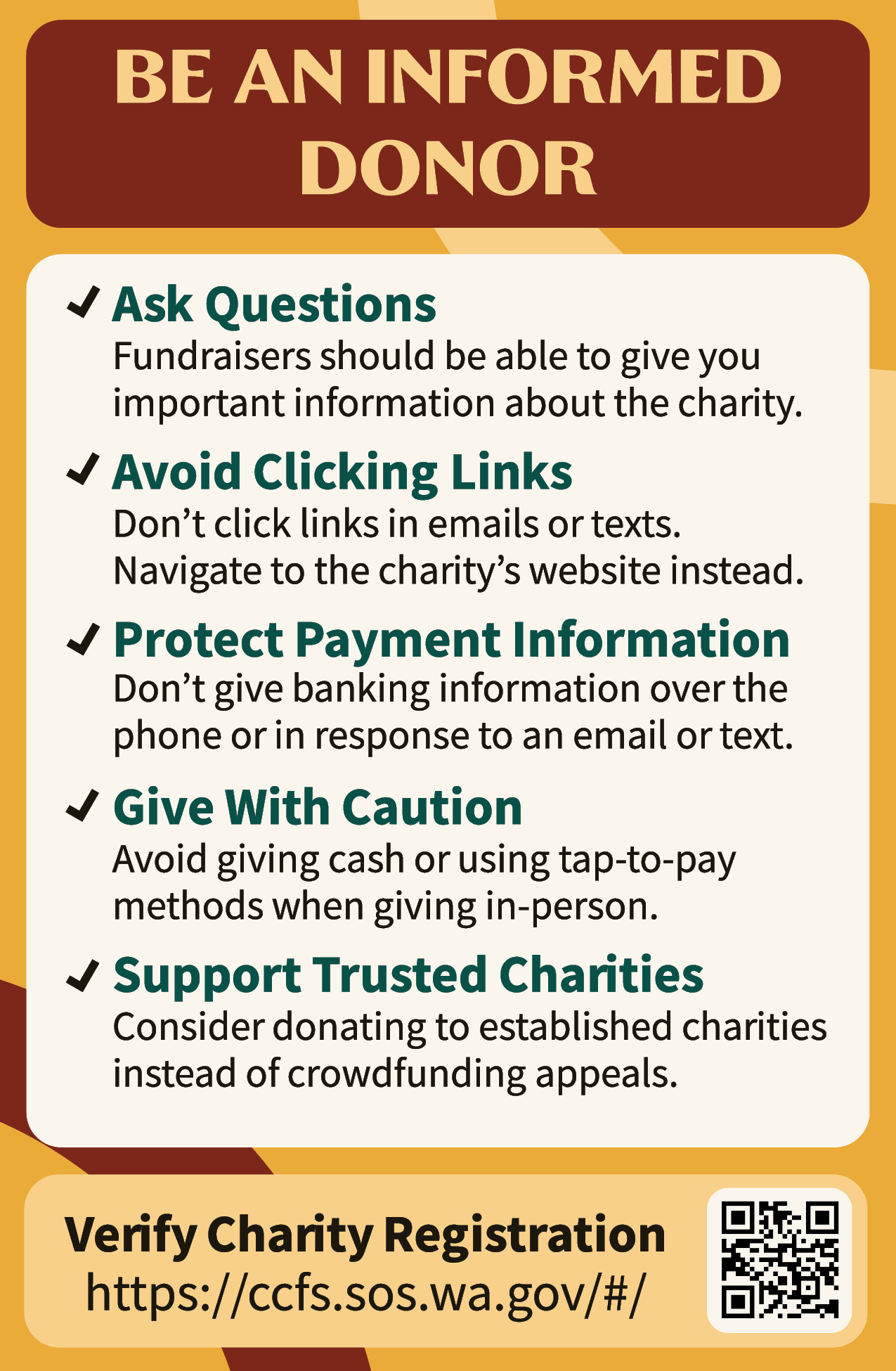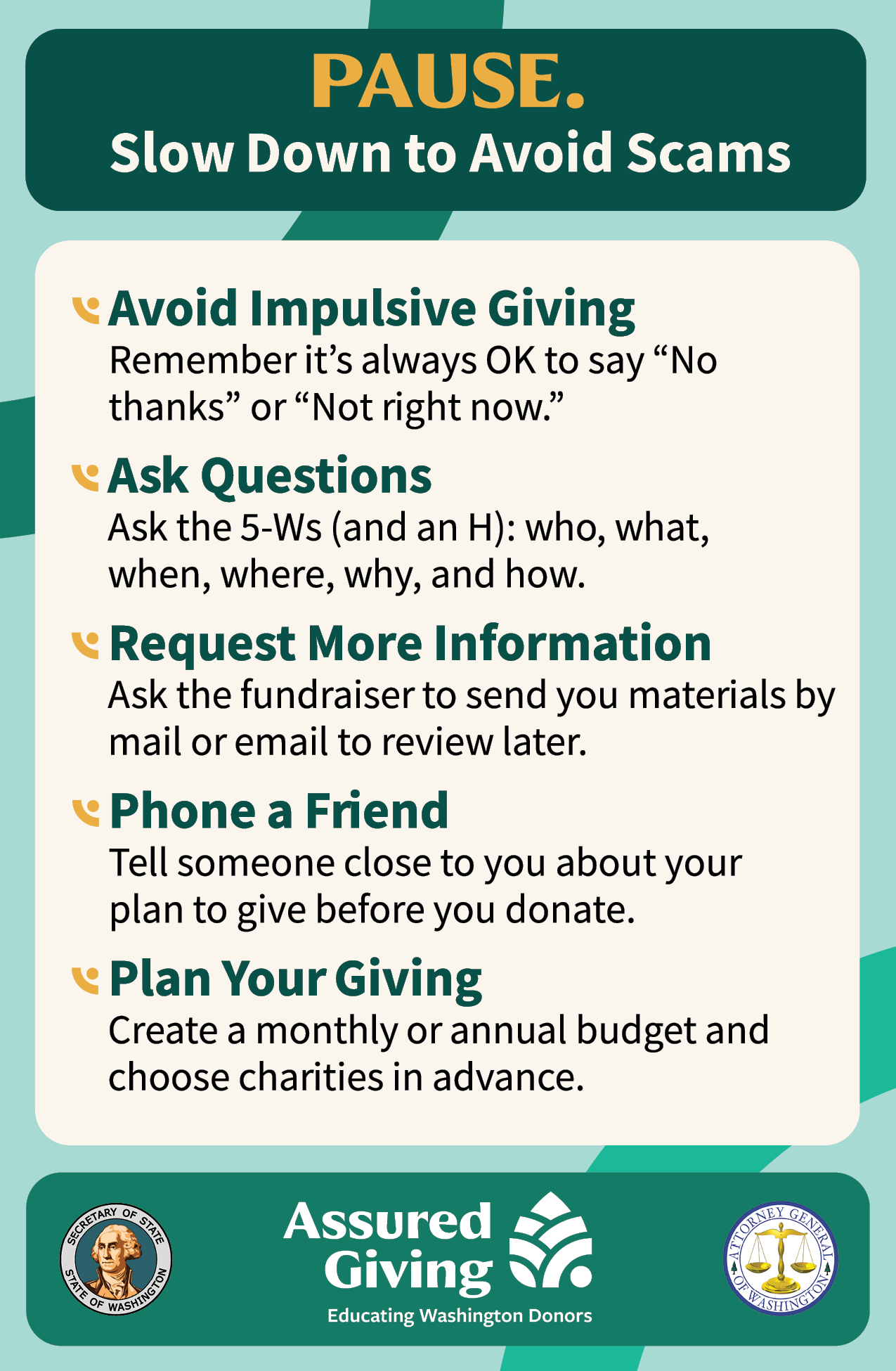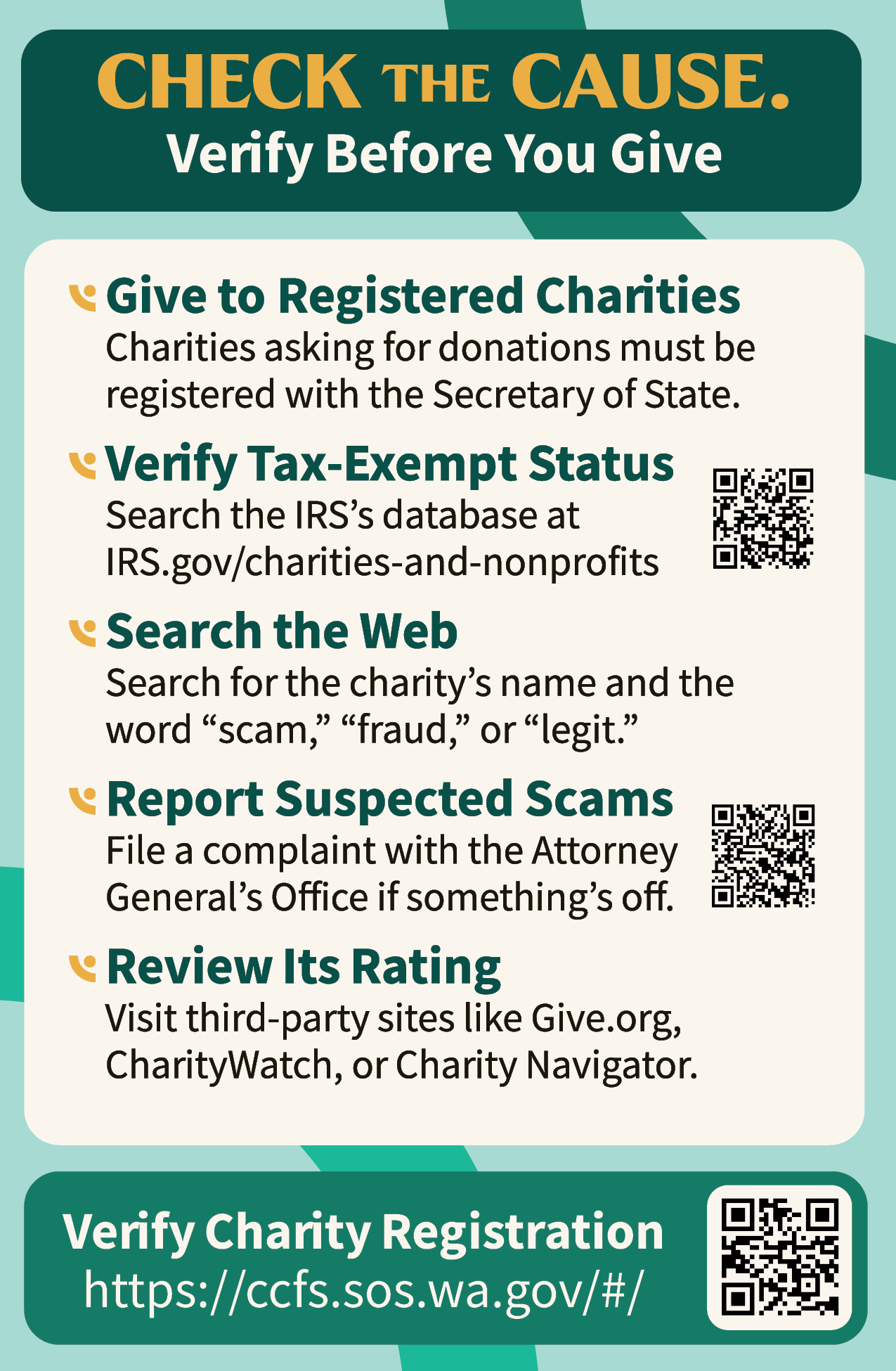Protección de Activos Caritativos
The Charitable Asset Protection Team (CAPT) of the Consumer Protection Division is charged with ensuring that charitable assets are used for their intended purpose. CAPT consists of attorneys, investigators, and professional staff all tasked with representing the public interest in matters involving public charities, charitable corporations, and charitable trusts.
Contact us
Attorney General of Washington
Consumer Protection Division
Attn: Charitable Asset Protection Team
800 5th Ave Ste 2000
Seattle, WA 98104
charities@atg.wa.gov
Fraud Awareness - "Pause. Check the Cause."The Attorney General's Office has partnered with the Washington State Office of the Secretary of State to share information on how to avoid falling victim to charity scams with a campaign called “Pause. Check the Cause.” Interested parties can request an educational session about ways to be savvy when making charitable donations by emailing charities@atg.wa.gov.
|
For donors
Charities and nonprofits are an integral part of daily life and American society. Many of us are asked to donate to charitable causes on a regular basis. Fundraising requests come from your friend’s daughter selling cookies, a post on social media, an unsolicited telephone call, and even while checking out at the grocery store. In Washington, the law defines a solicitation as any request for a donation that is accompanied by an appeal to charity. RCW 19.09.020(19).
While most solicitors and charities use the funds they collect for their charitable mission, some fundraisers are not so reputable. Some may misrepresent themselves, their cause, or how much of your donation will actually be used for charity. Some may use hardball tactics. A few may simply be out to scam you.
Thankfully, following some simple guidelines can help protect you from scams and make sure your gift is used for its intended purpose.
Research before giving
The best way to protect yourself from scams is to research the charity you are considering donating to prior to giving.
- Protect your donation by asking for the entity’s employer identification number (EIN). Every tax-exempt organization, including public charities, has a unique EIN and using it to search for a charity will provide more accurate results.
- Check the charity in the Washington Secretary of State’s searchable database of charitable organizations. A charity’s registration is not an endorsement by the Secretary of State and does not guarantee against deception, but it can be used to find basic information. The database includes information about the organization's location, whether it uses paid fundraisers, how much it raises per year, and the percentage of its expenses that are used to advance its charitable purpose.
- Check the charity in the IRS’ searchable database of tax forms filed by public charities. The database allows people to see whether the charity has maintained its tax-exempt status so the donation will be tax deductible.
- Check third-party research tools. Because these entities are non-governmental and have no affiliation with the Attorney General’s Office, we cannot vouch for the accuracy or completeness of the information on them.
Know whom you're giving to
Some fundraisers, charities, and scammers use deceptive tactics to confuse you about their identity. Common tactics include:
- Using a name that’s very similar to another well-known charity so it can borrow on the reputable charity’s goodwill.
- Using multiple names or “doing business as” names.
- Using words like “veteran,” “police,” “firefighter,” etc., to make it seem like they are associated with a legitimate government entity.
Use of deceptive tactics while fundraising is illegal. RCW 19.09.100. If an entity may have engaged in deceptive practices to get solicit donations, please file a complaint at https://www.atg.wa.gov/file-complaint.
Don't give in to pressure
Fundraisers sometimes use aggressive tactics to get you to donate. They may claim to have an immediate need for help. A fundraiser might use pre-recorded messages and a robo-dialer to call or text your phone an excessive number of times.
To avoid pressure techniques:
- Take time to verify what the fundraiser told you. A reputable organization should not object to you wanting to learn more about what it does.
- Ask questions to clarify something things you don’t understand, such as: “How much of my donation will be used for the charity’s purpose?” and “How does my donation benefit my community?”
- If the solicitor indicates you have to give now, ask them why. If they can’t give a satisfactory answer, wait to give.
Plan your giving
If you know you want to give – and know whom you want to give to – include a monthly or annual gift as a personal budget item and stick to that budget. When it comes time to do your taxes each year, reconsider both whom you donate to and how much you give.
Planning your giving each year helps you assess whether the charity fits your values and whether you can afford to give. When a solicitor calls, you can simply respond that you have already set your budget for the year.
Protect your personal information
One of the most valuable assets a charity has is its donor list. Some charities sell or lease their list to other charities, fundraisers, and even for-profit businesses. That’s why you might start getting fundraising requests for charities you’ve never heard of after you give to a different charity.
Before you give, ask about how your personal data is handled. The entity’s privacy policy should be readily available to a solicitor or on their website. You can also check for options that allow you to give anonymously or to opt out of data sharing.
Scammers sometimes pose as charities to get your personal banking information or your credit card number. Take one or more of these steps to protect your financial information:
- Never pay for a donation using a gift card, wire transfer, or digital currency (like Bitcoin).
- Be wary of giving your credit card or bank account information to a fundraiser who called you – you can always search for the entity’s website and give online directly or ask the solicitor for a pledge card that you may return.
- Don’t click on “donate” buttons or other links you receive in emails or text messages. Instead, navigate to the charity’s website and give directly.
Telemarketing
Charities and fundraisers frequently use telemarketing to solicit donations. Washington has specific laws addressing what telephone solicitors can do when they call you. Additionally, the Federal Trade Commission has adopted rules that place further restrictions on telemarketers (see the Telemarketing Sales Rule).
Under Washington law, solicitors must:
- Identify themselves; the company or organization they are calling for; and the purpose of the call (RCW 80.36.390(2), RCW 19.09.100(1)-(2)).
- If the solicitor is requesting a donation, they must ask you whether you want to continue the call, end the call, or be removed from the solicitor’s telephone lists (RCW 80.36.390(4)).
- End any solicitation call within 10 seconds of you saying you want to end the call (RCW 80.36.390(5)).
- Refrain from calling between 8 p.m. and 8 a.m. (RCW 80.36.390(7), RCW 19.09.100(16)) and from engaging in harassing, intimidating, or tormenting conduct (RCW 19.09.100(17).
- Send you disclosure information in the mail within five business days of your agreement to pledge money over the phone (RCW 19.09.100(3).
A telephone solicitor must honor your request to not receive more phone calls for at least one year. RCW 80.36.390(6).
Federal law also prohibits charities and commercial fundraisers from calling you using pre-recorded messages unless you’ve donated to them before. 16 CFR 310.
Other tips:
- Don’t trust your caller ID. Dishonest fundraisers can make calls look like they’re from your local area code to get you to answer.
- Hang up if you get a robo-call with a pre-recorded message from a charity you don’t know. It’s illegal for a charity to call you with pre-recorded messages, unless you’ve donated to them before. In that case, the caller must tell you that you can opt out of future calls and give you a way to do that.
- Consider blocking calls from unknown numbers, if you can.
If you think a solicitor has violated one or more of Washington’s rules governing telemarketing, you can submit a complaint to the Attorney General’s Office here: https://www.atg.wa.gov/file-complaint.
For more resources and information, visit the Washington Secretary of State Corporations and Charities webpage.
(Updated Dec. 22, 2025)

 Other Languages
Other Languages


